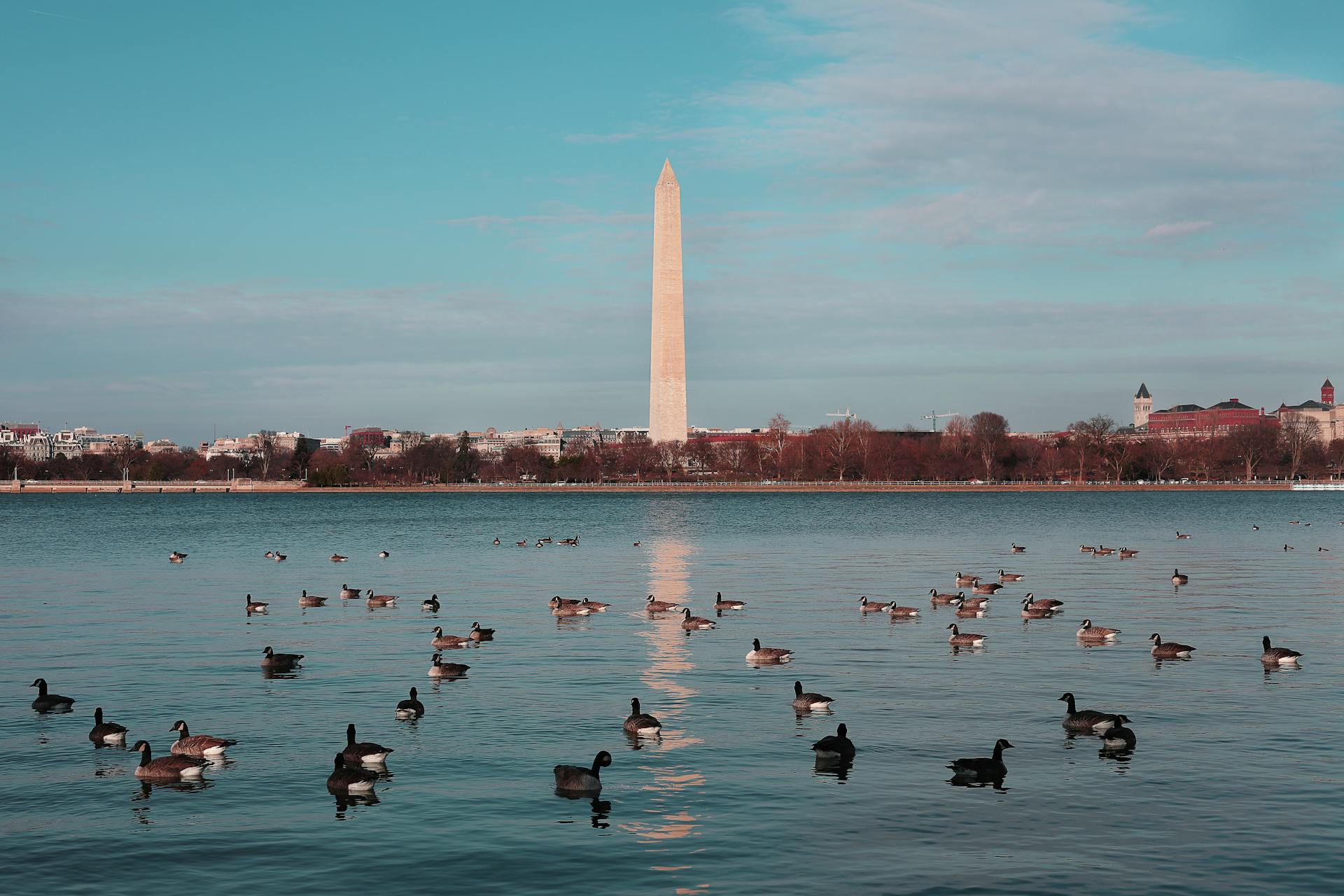
In Washington State, auto insurance claims are regulated by the Office of the Insurance Commissioner. The state requires all drivers to carry liability insurance to cover damages or injuries caused to others in an accident.
The minimum liability coverage limits in Washington State are $25,000 for bodily injury or death per person, $50,000 for bodily injury or death per accident, and $10,000 for property damage. This is the minimum amount you must have to drive legally in the state.
If you're involved in an accident, you're required to report it to your insurance company within a certain timeframe, which is typically 30 days. This allows your insurance company to process your claim and provide you with the necessary support.
Worth a look: Fortress Re
Washington State Auto Insurance Claim Laws
In Washington state, auto insurers have a duty to act in good faith by cooperating with claimants and making fair efforts to resolve claims. This means they must give prompt attention to all claims, evaluate them by their own merits, and make payment in a reasonably prompt manner.
Additional reading: Understanding Insurance Claims
Insurance companies must follow the rules set by the Office of the Insurance Commissioner (OIC) under the Insurance Fair Conduct Act (IFCA). This regulation is found at RCW 48.02 and WAC 284.
If an insurance company unreasonably denies your claim or fails to conduct a responsible investigation, it's a violation of the law. You can request OIC help to enforce your rights.
You have legal rights under the IFCA, and the insurance Commissioner will assist you in enforcing them. If an insurance company engages in unfair claims settlement practices, you can seek treble damages in court and payment of your attorney fees.
The Insurance Fair Conduct Act (IFCA) is a crucial regulation in Washington state that protects consumers from unfair insurance practices. Here are some key facts about the IFCA:
- You can request OIC help if you feel your insurance company has violated the IFCA.
- You can seek treble damages in court and payment of your attorney fees for violations of IFCA.
Filing and Compensation
Filing a car accident insurance claim in Washington state can be a complex process, but it's essential to understand your options for compensation.
If you're involved in a car accident, you might file a car accident property damage claim with the at-fault driver's insurance company, but exceptions apply.
To determine whose insurance pays for car accident damage, consider the following scenarios: if the other driver is more than 50% at fault, their insurance provider pays; if you're more than 50% at fault, your own insurance policy covers your car, and your liability for the other driver's car; if fault is shared, both drivers file claims with their respective insurance providers; and if the other driver is uninsured, your uninsured driver policy covers your repairs.
You can file a first-party claim against your own insurance policy if you have the proper insurance coverage, including comprehensive coverage for non-collision causes like natural disasters, theft, or vandalism.
To increase your chances of getting compensation, document everything about the accident scene, seek multiple appraisals and expert opinions of the value of your damages, and consider hiring a car insurance lawyer to help you navigate the process.
If the other driver's liability policy isn't enough to cover the cost of replacing damaged property, you may need to sue for property damage.
On a similar theme: Commercial Property Insurance Coverage Questions
In cases where fault is unclear, insurance adjusters will conduct independent investigations to determine responsibility and assign a percentage of fault to each driver.
If your car is damaged beyond repair, your collision insurance policy will write it off as a total loss and reimburse you for the car's actual value, not the amount you owe. Consider purchasing gap insurance to cover the difference.
You're entitled to claim the loss of your ability to use your vehicle from the time of the car accident until it's repaired, regardless of whether you rent a substitute vehicle.
Here's a summary of the steps to take after a car accident:
- Document the accident scene and gather evidence.
- Notify your insurance provider and the other driver's insurance provider.
- Seek multiple appraisals and expert opinions of the value of your damages.
- Consider hiring a car insurance lawyer to help you navigate the process.
- File a first-party claim against your own insurance policy if necessary.
- Sue for property damage if the other driver's liability policy isn't enough to cover the cost.
Insurance Options and Requirements
In Washington state, you're required to have proof of financial responsibility for the future, which means you must be able to show you can pay for damages you cause in an accident. This is often met by purchasing a liability insurance policy.
To comply with the law, you'll need a liability insurance policy with at least 25/50/10 coverage limits. This means the policy should cover up to $25,000 for bodily injury or death to one person, $50,000 for two or more people, and $10,000 for property damage.
The 25/50/10 coverage is the minimum required by Washington law, but it's essential to consider higher coverage limits to protect yourself from financial ruin if you're responsible for an accident with significant damages.
You might like: Georgia Minimum Liability Coverage
Do I Need PIP Coverage?
In Washington, you don't need to buy personal injury protection (PIP) car insurance coverage, but there's a catch.
Washington law requires insurance companies to include PIP coverage in liability policies unless you specifically waive it in writing. This means you'll likely be charged extra for it.
After a car accident, PIP coverage pays for medical bills, lost income, and other financial losses resulting from crash injuries, regardless of who caused the accident.
PIP coverage extends to the policyholder, most household family members, anyone riding as a passenger in the policyholder's vehicle, and even pedestrians hit by the policyholder's vehicle.
Financial Responsibility Requirements
The minimum financial responsibility requirements are quite specific: $25,000 for bodily injury to one person, $50,000 for bodily injuries to two or more people, and $10,000 for property damage.
To meet these requirements, you have three options. You can choose to purchase a liability insurance policy, which is the most common way to comply with the law.
The minimum liability insurance policy in Washington is often described as "25/50/10 coverage", which means it covers up to $25,000 for bodily injury to one person, $50,000 for bodily injuries to two or more people, and $10,000 for property damage.
Keep in mind that 25/50/10 coverage is only the minimum required by Washington law. If you cause an accident that causes damages higher than your policy limits, you'll be responsible for the amounts exceeding your coverage.
Here are the minimum financial responsibility requirements in Washington:
Accidents and Liability
In Washington state, determining liability after a car accident can be a complex process. Washington is a comparative fault state, which means that each driver can share some percentage of the blame for the accident.
If you're involved in a car accident, you may need to file a claim against the at-fault driver's insurance company. You can either bring a third-party claim against the responsible driver or file a first-party claim against your own insurance. Third-party claims allow you to collect personal injury damages, including medical bills, lost wages, and pain and suffering, if your claim or lawsuit succeeds.First-party claims, on the other hand, allow you to recover expenses from your own insurance, but you'll need to pay the deductible.
Insurance companies will typically designate an adjuster to determine fault after an accident, but it can take time to collect from the at-fault driver's insurance. In some cases, you may need to use your own insurance coverage to cover your expenses while you wait for the at-fault driver's insurance to settle.
Expand your knowledge: How to File Insurance Claim against Other Driver State Farm
Liability After an Accident
In Washington state, the at-fault driver is responsible for paying for property damage in car accidents. This means that if you're involved in an accident, you can file a claim against the other driver's insurance company to recover damages.
The insurance company will designate an adjuster to determine fault, but to recoup losses, victims must file a claim with the at-fault driver's insurance company. If it takes a long time to determine fault, drivers can utilize their own insurance coverage to cover their expenses.
Washington is a comparative fault state, which means that each driver can share some percentage of the blame for the accident. Your settlement will be reduced depending on your degree of responsibility.
Here are the possible ways to handle liability after an accident:
- Bring a third-party claim against the responsible driver.
- File a first-party claim against your own insurance.
- File a claim under your own uninsured motorist coverage if the at-fault driver is uninsured.
Penalties for Driving Without License
Driving without a valid license can have serious consequences in Washington. You could be ordered to pay a fine of $550 or more.
Driving without a license is a serious offense, and the penalties can be steep. If you're involved in an accident, your license might be suspended for up to three years if you own or drive an uninsured motor vehicle that's involved in an accident resulting in personal injury or property damage of at least $1,000.
Here are some key facts about penalties for driving without a license in Washington:
- Fines can range from $550 to more.
- Licenses can be suspended for up to three years if involved in an accident with at least $1,000 in damages or injuries.
If you're caught driving without a license, you'll need to take immediate action to rectify the situation. This may involve obtaining a new license or taking a driver's education course.
What Is Subrogation?
Subrogation is when your insurer seeks reimbursement from the at-fault party for costs they covered.
If your insurer pays for your medical treatment after an accident, they can legally recover those costs from the responsible party or their insurer, which is why it's essential to cooperate with your insurer during this process.
On a similar theme: Mutual Insurer
Your insurer will include any deductible you paid in the reimbursement demand, so be prepared to provide that information if needed.
If you're partially at fault, you'll only recover a percentage of your deductible, so it's crucial to understand your level of responsibility in the accident.
Your insurer expects you to notify them if you plan to settle with the at-fault party to protect their right to subrogation.
Recommended read: Auto Insurer
State Laws
Washington state follows a no-fault system for auto insurance claims. This means that each driver's insurance company typically covers their own medical expenses and other financial losses, up to a specified limit, regardless of who is at fault in a car accident.
No-fault laws are designed to simplify the claims procedure, lower court expenses, and minimize the need for litigation. This approach can make the process of filing a claim less complicated and less stressful for drivers.
In states with no-fault laws, each driver is required to submit an injury claim to their insurance company. This is a key aspect of the no-fault system, as it ensures that drivers receive the coverage they need to recover from an accident.
For your interest: Insurance Cover on Business - Merchant Services
Timeframe for Acceptance/Denial Notifications
In Washington State, insurers have a strict timeframe for notifying claimants about the status of their insurance claim. Insurers must notify first-party claimants within fifteen working days whether the claim has been accepted or denied.
This notification must include written reasons for any denial. If more time is needed for investigation, insurers must inform claimants promptly and provide updates every thirty days thereafter.
Insurers cannot deny claims based solely on policy provisions without explicit reference. This means they must clearly explain the reason for denial.
Take a look at this: Auto Insurance Claim Denial Attorney
Hiring an Attorney
Hiring an attorney can be a crucial step in navigating Washington state auto insurance claim laws. If you've been involved in a car accident, it's essential to know your rights so you can receive the compensation you deserve.
In the past, most people were able to resolve their property damage claims with the insurance company on their own, but this is no longer the case. Insurance companies are becoming more aggressive, and it's frequently necessary to obtain an attorney to recover all of the damages you have suffered.
Check this out: Lawyer for Auto Insurance Claim
You may need an attorney if you've suffered injuries as well as property damage in the accident. An attorney will assist you with recovering all of the damages you have suffered, including medical expenses and property damage.
Here are some common reasons to hire a car insurance attorney:
- Helps eliminate the stress of having to navigate uncertainty with the at-fault insurance agency
- You are getting pressure from the insurance agency to ‘settle’ the claim before understanding certain rights that you are guaranteed after an auto accident
- You have any injuries sustained after the auto accident
Bad Faith
Bad faith is a serious issue in insurance claims. It's when an insurance company fails to act in good faith with their policyholder, often resulting in the policyholder being denied fair compensation.
A significant case involved a woman who was involved in a serious motor vehicle accident in 2009. She carried a $500,000 UM/UIM policy to cover herself, but her initial claims were denied by the insurance company.
Insurance companies may deny claims or make unreasonable settlement offers, as seen in this case where the final offer was less than the cost of the client's medical bills. This can be a frustrating and stressful experience for policyholders.
See what others are reading: Colorado Bad Faith Insurance Statute
In this case, the insurance company was forced to pay the full policy limits of $500,000 after an independent arbiter determined the client was owed that amount. The client then received another $500,000 settlement for the bad faith claim.
Hiring an attorney who is experienced in handling bad faith insurance claims can help policyholders navigate these complex issues.
Should You Hire an Attorney After an Accident?
Hiring an attorney after an accident can be a crucial step in ensuring you receive the compensation you deserve. In fact, insurance companies are becoming increasingly aggressive with property damage claims, making it necessary to obtain an attorney to recover all of your damages.
Navigating auto insurance laws and the intricacies of Washington's at-fault system can be intricate, and personal injury lawsuits are more prevalent in tort/fault states. If you've been involved in a car accident, it's essential to know your rights.
Here are some common reasons to hire a car insurance attorney:
- Helps eliminate the stress of having to navigate uncertainty with the at-fault insurance agency
- You are getting pressure from the insurance agency to 'settle' the claim before understanding certain rights that you are guaranteed after an auto accident
- You have any injuries sustained after the auto accident and need to file injury claims within a limited time frame
In Washington State, you have a limited time to file injury claims, and an experienced car insurance lawyer can walk you through the process and help you get a settlement to cover your medical expenses. Insurance bad faith cases can also occur, where the insurance company fails to act in good faith with you, and an attorney can help you navigate this complex process.
If you're unsure about how to proceed, you can contact the consumer advocacy program at the office of the Insurance Commissioner at 206-256-2700 or reach out to a qualified attorney for guidance.
On a similar theme: Help Insurance Claim
The Law Offices of Michael Clark in Tacoma
The Law Offices of Michael Clark in Tacoma are a team of experienced lawyers who have handled car accident cases for 26 years. They are well-versed in Washington State's complex laws.
Their lawyers are here to provide personalized legal counsel to those who have been injured in accidents caused by negligent drivers, drunk drivers, or other circumstances. They can help you navigate the system and get the compensation you deserve.
Washington State uses a system called pure comparative negligence, which means that even if you were partially at fault in the accident, you can still collect damages based on your degree of fault. For example, if you're 99% at fault, you can still receive 1% compensation from the other driver.
If you or a loved one has been in an accident, it's essential to seek immediate legal assistance to safeguard your rights. The Law Offices of Michael Clark in Tacoma offer free consultations to help you get started.
Readers also liked: What Insurance Companies Cover Delivery Drivers
Frequently Asked Questions
How long does an insurance company have to settle a claim in WA?
In Washington, an insurance company has 15 working days to inform you about the status of your claim after receiving a properly executed proof of loss. If your claim is accepted, the company will settle it within this timeframe.
How long after an accident do you have to file a claim in Washington State?
In Washington State, you have up to three years from the accident date to file a personal injury claim. This timeframe applies to most types of accidents, but specific details may vary depending on the circumstances.
Sources
- https://www.sharpelawfirm.org/personal-injury/law-library/the-office-of-the-insurance-commissioner/
- https://www.injurytriallawyer.com/blog/insurance-bad-faith-laws-washington-state/
- https://lehmlaw.com/blog/what-to-expect-after-an-auto-accident-property-damage
- https://www.nolo.com/legal-encyclopedia/washington-car-insurance-requirements.html
- https://tacomainjurylaw.com/auto-insurance-washington-state/
Featured Images: pexels.com


